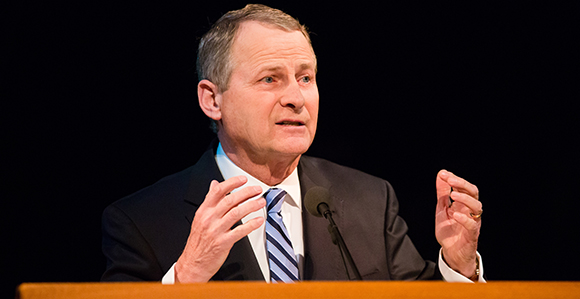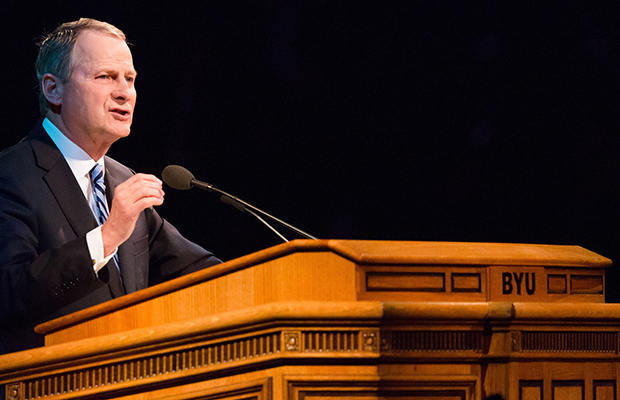Humbly Use Both Heart and Mind to Learn and Serve Best, Seventy Teaches
Contributed By Marianne Holman Prescott, Church News staff writer

Elder LeGrand R. Curtis Jr., a General Authority Seventy, speaks during a campus devotional at Brigham Young University on January 16.
Article Highlights
- It is through humility and a combination of learning with the heart and mind that the greatest understanding takes place.
“As we rejoice in the blessing of being able to think and to learn, it is imperative that we never lose our sense of humility before God.” —Elder LeGrand R. Curtis Jr. of the Seventy
PROVO, UTAH
Both heart and mind—and humility—are essential to learning and serving in the Church, Elder LeGrand R. Curtis Jr., General Authority Seventy, said during a campus devotional at Brigham Young University on January 16.
Held less than an hour after the announcement of a new prophet and First Presidency, the event brought students together on the BYU campus—as well as listeners tuned in around the world via BYUtv—to hear a message from Elder Curtis.
Speaking on the topic “humbly combining heart and mind,” Elder Curtis taught about the process of knowledge and looked at connections found in the scriptures between the heart and the mind.
Drawing from the words of King Benjamin in the Book of Mormon, Elder Curtis taught of how the sermon offers insights into the interaction of the heart and the mind.
“I find it intriguing that the people were urged to open their hearts to understand,” he said. “We usually think of understanding as being associated with the brain. But one of the lessons of this sermon is that spiritual things are understood with the heart—that is, by feelings of the Spirit within us. But the brain is not left out of the process.”
Sharing experiences he had as a young man studying at BYU, Elder Curtis said it was at that time in his life that he came to appreciate “what can happen as the mind and the heart, or Spirit, work together.”
Whether it was in a class, listening to a devotional, reading the words of powerful intellects, or associating with other students on campus, Elder Curtis said those experiences challenged his thinking and “showed me how the wonderful principles of the gospel called for my very best thinking and, more importantly, my very best living.”
While recognizing the positive outcomes, Elder Curtis also offered students a warning.
“While I rejoice in what can happen as the Spirit and the mind are joined in serious study, there is a caution that all of us who love the things of the mind need to take very seriously. … As we rejoice in the blessing of being able to think and to learn, it is imperative that we never lose our sense of humility before God,” he said.
The greatest thinking in the world is “foolishness” if the thinker does not hearken to the counsel of God, Elder Curtis said.
“The fact that man does not comprehend all that God can comprehend should make us deeply humble before Him and willing to follow His counsel in all things,” he said. “It should make us anxious to have the Spirit enlighten our minds and enhance our understanding.”
Sharing the story of his “scholarly friend,” Elder Curtis spoke of how his friend stopped attending church because he didn’t find the discussions in their Church meetings to be “interesting.”
“His focus had moved away from the combination of mind and Spirit,” he said.
It is through staying humble that a person is able to recognize the need for God’s wisdom in all things, he taught.
“In our efforts to maintain the humility that we must have, we are blessed to have the examples of those who lead us,” he said.
Mentioning the new First Presidency, as well as other Church leaders he has worked with over the 14 years he has been a General Authority, Elder Curtis said it is the humility of those leaders that stands out.
“They are strong, powerful leaders,” he said. “But they also are humble, gracious, and regularly seek the counsel of those around them. Many of these Apostles have advanced degrees from prestigious schools or other significant accomplishments, but those degrees and those accomplishments do not keep them from being humble. To the contrary, they are, like Alma, ‘humble servant[s] of God.’”
It is through humility and a combination of learning with the heart and mind that the greatest understanding takes place. The prime example of this is the Savior, Elder Curtis taught.
“He had a place of great preeminence in the pre-earth life. He created this and other worlds. Yet He accepted fully His Father’s plan for our salvation and voluntarily came to this earth to live and minister in the most humble of circumstances. In all that He did, He sought only the glory of the Father and to see the Father’s will done.”

Elder LeGrand R. Curtis Jr., a General Authority Seventy, speaks during a campus devotional at Brigham Young University on January 16. Photo by Gabriel Mayberry, BYU.
